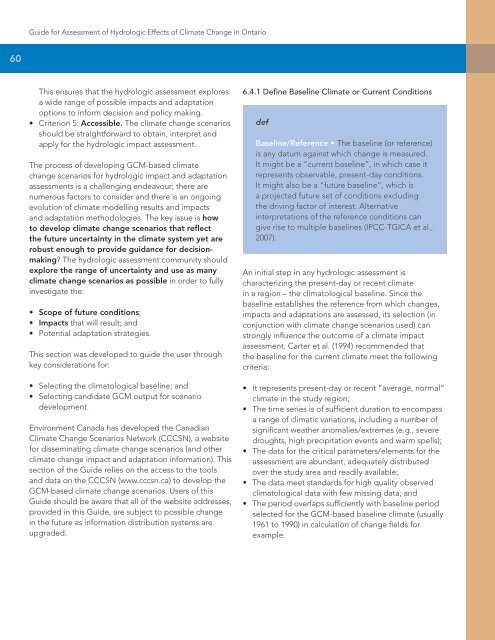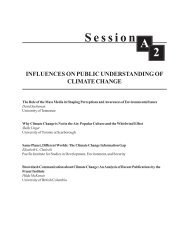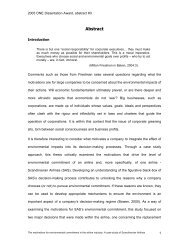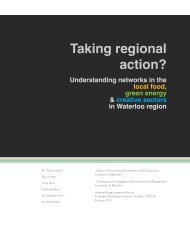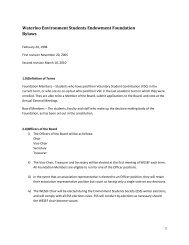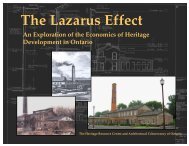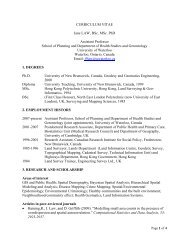ClimateChange Assessment Guide.pdf - University of Waterloo
ClimateChange Assessment Guide.pdf - University of Waterloo
ClimateChange Assessment Guide.pdf - University of Waterloo
You also want an ePaper? Increase the reach of your titles
YUMPU automatically turns print PDFs into web optimized ePapers that Google loves.
<strong>Guide</strong> for <strong>Assessment</strong> <strong>of</strong> Hydrologic Effects <strong>of</strong> Climate Change in Ontario60This ensures that the hydrologic assessment exploresa wide range <strong>of</strong> possible impacts and adaptationoptions to inform decision and policy making.• Criterion 5: Accessible. The climate change scenariosshould be straightforward to obtain, interpret andapply for the hydrologic impact assessment.The process <strong>of</strong> developing GCM-based climatechange scenarios for hydrologic impact and adaptationassessments is a challenging endeavour; there arenumerous factors to consider and there is an ongoingevolution <strong>of</strong> climate modelling results and impactsand adaptation methodologies. The key issue is howto develop climate change scenarios that reflectthe future uncertainty in the climate system yet arerobust enough to provide guidance for decisionmaking?The hydrologic assessment community shouldexplore the range <strong>of</strong> uncertainty and use as manyclimate change scenarios as possible in order to fullyinvestigate the:• Scope <strong>of</strong> future conditions;• Impacts that will result; and• Potential adaptation strategies.This section was developed to guide the user throughkey considerations for:• Selecting the climatological baseline; and• Selecting candidate GCM output for scenariodevelopment.Environment Canada has developed the CanadianClimate Change Scenarios Network (CCCSN), a websitefor disseminating climate change scenarios (and otherclimate change impact and adaptation information). Thissection <strong>of</strong> the <strong>Guide</strong> relies on the access to the toolsand data on the CCCSN (www.cccsn.ca) to develop theGCM-based climate change scenarios. Users <strong>of</strong> this<strong>Guide</strong> should be aware that all <strong>of</strong> the website addresses,provided in this <strong>Guide</strong>, are subject to possible changein the future as information distribution systems areupgraded.6.4.1 Define Baseline Climate or Current ConditionsdefBaseline/Reference • The baseline (or reference)is any datum against which change is measured.It might be a “current baseline”, in which case itrepresents observable, present-day conditions.It might also be a “future baseline”, which isa projected future set <strong>of</strong> conditions excludingthe driving factor <strong>of</strong> interest. Alternativeinterpretations <strong>of</strong> the reference conditions cangive rise to multiple baselines (IPCC-TGICA et al.,2007).An initial step in any hydrologic assessment ischaracterizing the present-day or recent climatein a region – the climatological baseline. Since thebaseline establishes the reference from which changes,impacts and adaptations are assessed, its selection (inconjunction with climate change scenarios used) canstrongly influence the outcome <strong>of</strong> a climate impactassessment. Carter et al. (1994) recommended thatthe baseline for the current climate meet the followingcriteria:• It represents present-day or recent “average, normal”climate in the study region;• The time series is <strong>of</strong> sufficient duration to encompassa range <strong>of</strong> climatic variations, including a number <strong>of</strong>significant weather anomalies/extremes (e.g., severedroughts, high precipitation events and warm spells);• The data for the critical parameters/elements for theassessment are abundant, adequately distributedover the study area and readily available;• The data meet standards for high quality observedclimatological data with few missing data; and• The period overlaps sufficiently with baseline periodselected for the GCM-based baseline climate (usually1961 to 1990) in calculation <strong>of</strong> change fields forexample.


